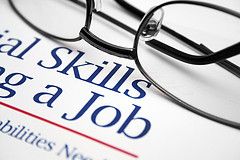Consumer Behavior
What's Your Core Skill and What Careers Match?
One or more careers that match each of 26 skills.
Posted November 22, 2014

In a previous PsychologyToday.com article, I reviewed the hundreds of skills listed in Gallup’s Strengths Finder, Eureka’s Microskills, the Knowdell Motivated Skills Card Sort, Elevations, and Skills Profiler, and then adapted or wrote 26 skills that I believe are most likely to help people find and succeed in white-collar or professional employment.
In this article, for each of those skills, I list one or more careers that require that skill and is liked by many people. For each career, I include a link to a site with information on it.
This article may be of use to you even if you’re staying put in your current career or job. Scan the list of skills to find one or more that you’re good at and would enjoy using more in your job. Might there be ways to tweak what you do so you spend more time using your favorite skills?
People
1. Communicate one-on-one. Perceptive and patient listening and emotional intelligence: knowing what will engender positive and negative feelings and behaviors.
Specialty therapist: eating disorders, grief, divorce.
2. Coach. In athletics, personal growth, financial, etc, balance facilitation and advice.
Specialty coach (e.g., lawyers, menopause, executives, stay-at-home parents.)
3. Inspire. Motivate supervisees, customers, or clients to take action.
Manager or executive: (private, govt or nonprofit sector)
4. Negotiate. Get parties to agree, including in contentious situations.
Union or management negotiator.
5. Liaise. Connect people with each other and to resources.
Words
6. Write. Expeditiously create clear, helpful, and if appropriate, entertaining prose.
Marketing communication or investor relations writer.
7. Give a talk. Concisely, enjoyably teach to convey content and/or change behavior.
8. Explain and advise. Explain clearly and advise wisely without engendering undue resistance.
Technical support, customer service
Ideas
9. Generate ideas. Regularly come up with fresh yet workable approaches.
Researcher (financial services, marketing, scientific, academic, government)
10. Analyze and synthesize. Distill information into its key elements and then reconstitute it into a logical whole.
Analyst, for example, a financial analyst for an investment company, marketing analyst for a company, or program analyst for government or nonprofit.
11. Evaluate. Judge the quality and cost-effectiveness of programs, employees, etc.
Business (for- and non-profit)
12. Sell/fundraise. Easily engender trust, remain ethical despite being motivated to achieve financial targets, and be resilient in the face of rejection.
Sales: business-to-business, for example, cleantech, medical devices
13. Start a business. Identify a need, then develop and lead a practical plan to meet it.
Shoestring business: e.g., a chain of airport or hotel shoeshine stands, gift carts or flower stands near busy train and bus stations, etc.
Technical
14. Molecular biology. Competence in working at the molecular and genomic levels.
Research on the foundations of mid-prevalence disease: for example, Crohn’s Disease, macular degeneration, Down’s Syndrome. (The competition is tough for positions studying high-prevalence diseases such as cancer and too few people suffer from “orphan” diseases such as Prader-Willi Syndrome to generate sufficient funding.)
15. Chemistry or physics. Analyze and create substances and develop predictive models.
Nanochemist: Develop nanomaterials, for example, for cancer treatment, strengthening products such as metal, cement and fabric, and miniaturizing electronics.
16. Quantitative reasoning. Use mathematical or statistical procedures to analyze data or solve problems.
Mathematical modeler: for example, for foiling cyberhackers, querying customer databases, developing materials, setting tax rates or pricing, understanding genomics.
17. Develop software. Use key languages (e.g., C# and Java) and reasoning ability to create elegant or at least functional, bug-light code.
Robotic/automated vehicle engineer. Develop software and hardware for driverless vehicles: drone delivery, driverless cars, trucks, and trains.
18. Design. Engineer or otherwise design products.
19. Treat. Accurately diagnose and successfully treat conditions.
Physician assistant. This offers high patient-success rate, moderate length of training, and six-figure income. Also, with America moving to providing health care for all, major cost savings will be needed. A likely source will be to replace most primary care physicians with physician assistants.
20. Entertain. Consistently attract and please significant numbers of live and/or digital audience members.
Gamefier: For example, pair with educators to develop children’s edutainment apps and create more entertaining online courses (MOOCs.)
21. Produce art. Using hand drawing and computed-based tools, time-effectively develop professional-level renderings for fine-art and, usually more lucratively, commercial use.
Graphic designer. It’s tough to get a job unless you have both the artistic chops and business sense: what will increase revenue.
Miscellaneous soft skills
22. Handle details. Making few errors, coordinate events, audit financials, etc.
Forensic accountant. You might investigate fraud or, for government, to identify tax cheats, money laundering, etc.
23. Organize. Arrange events, documents or other objects in a structured way.
24. Remain calm. Retain composure in emergencies and with stressed people.
25. Be efficient. Be time- and cost-effective.
26. Aesthetic judgment. Accurately predict what customers and coworkers will deem attractive.
Clothing, furniture, or art buyer/purchasing agent.
Marty Nemko's bio is in Wikipedia.




